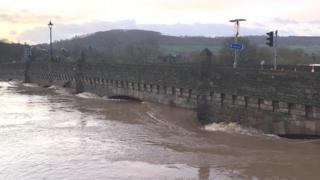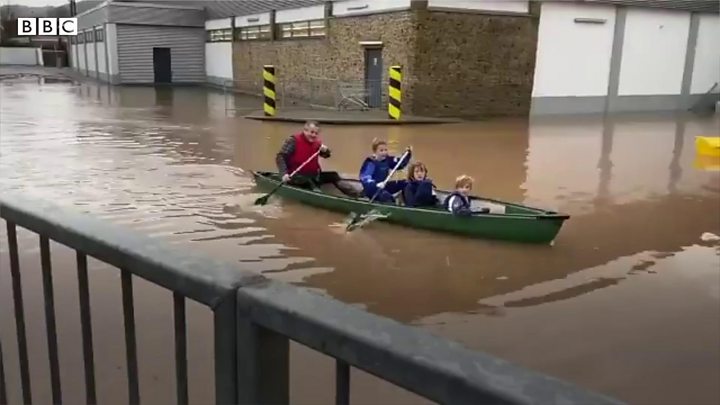Storm Dennis: Flood warnings as River Wye reaches record high

There are two severe flood warnings - meaning a danger to life - and the River Wye has reached a record high in the wake of Storm Dennis.
Homes were evacuated on Monday night and the river's water levels at Monmouth reached 7.15m (23ft) by 08:30 GMT on Tuesday.
The last recorded highest level was in 2002 when it peaked at 6.48m (21ft).
More rain is forecast with a Met Office yellow warning issued for Wednesday and Thursday.
Monmouthshire council has set up an evacuation centre at the Shire Hall in Monmouth for residents.
Mariana Robinson, whose home looks out over Monmouth and the wider valley, said she could see homes, businesses and the rail line under water.
"It's frightening," she told BBC Radio Wales Breakfast.
"I have been here 35 years and I have never seen so much water in that valley."

A major stretch of A40 from Monmouth to Ross on Wye has been closed due to flooding.
Gwent Police urged motorists not to attempt to drive on the closed A40 between Monmouth and Ross on Wye, saying it was "too dangerous to pass".
Rail passengers have been told to expect a third day of significant disruption.
Transport for Wales (TfW) said there had been significant damage to the network and urged people to check before they travel.
A major incident was declared in south Wales on Sunday following landslips and unprecedented flooding.
Elsewhere in Wales, residents are continuing the clean-up after the storm led to widespread flooding and disruption continues with roads and rail lines blocked.
One woman has died after being swept away in floods in Worcestershire, and Herefordshire and Shropshire have also been hit by flooding.
TfW customer delivery director Bethan Jelfs said: "It is inevitable that some services on Tuesday morning will be subject to disruption which will result in delays and cancellations.
"Where trains are cancelled or terminating short of destination, every effort will be made to provide a rail replacement bus service wherever possible.
"Some roads are also subject to delays too as a result of flooding and related damage, and journeys may take significantly longer than is usual on many routes."
Disrupted rail services:
- Cardiff Valley Lines: All lines north of Pontypridd (including Aberdare, Merthyr and Treherbert) are closed
- Aberdare: Likely to be closed for a number of days, rail replacement bus service in place
- Treherbert: Likely to remain closed on Tuesday, rail replacement bus service in place
- Ebbw Vale: Line closed following a landslip but may reopen on Tuesday afternoon
- Newport - Hereford: Line currently closed, services on the Marches line will be replaced by a rail replacement bus service due to flooding
- Heart of Wales line: Closed but may reopen on Tuesday afternoon
- Conwy Valley: Line closed, a rail replacement bus service will operate between Llandudno Junction and Blaenau Ffestiniog until further notice
- Cambrian Line: Shrewsbury to Aberystwyth will remain closed on Tuesday with a rail replacement bus service in place. Line may reopen later
- The Cambrian Coastline: Machynlleth - Pwllheli will remain closed on Tuesday with rail replacement bus service in place but may reopen later
Weather warnings
Up to 100mm (3.9in) of rain could fall in north Wales and 60mm (2.3in) in south Wales between Wednesday and Thursday, the Met Office has said.
The affected local authority areas are Blaenau Gwent, Bridgend, Caerphilly, Cardiff, Carmarthenshire, Ceredigion, Conwy, Denbighshire, Gwynedd, Merthyr Tydfil, Monmouthshire, Neath Port Talbot, Newport, Powys, Rhondda Cynon Taff, Swansea, Torfaen, Vale of Glamorgan and Wrexham.
There are two severe flood warnings - meaning a danger to life - for the River Wye in Monmouth and four flood warnings - meaning immediate action is needed - on the River Ritec at Tenby, River Monnow at Skenfrith and Osbaston, and the Lower Dee Valley between Llangollen and Wrexham.
How have you been affected by Storm Dennis? Tell us your story by emailing haveyoursay@bbc.co.uk.
Please include a contact number if you are willing to speak to a BBC journalist. You can also contact us in the following ways: